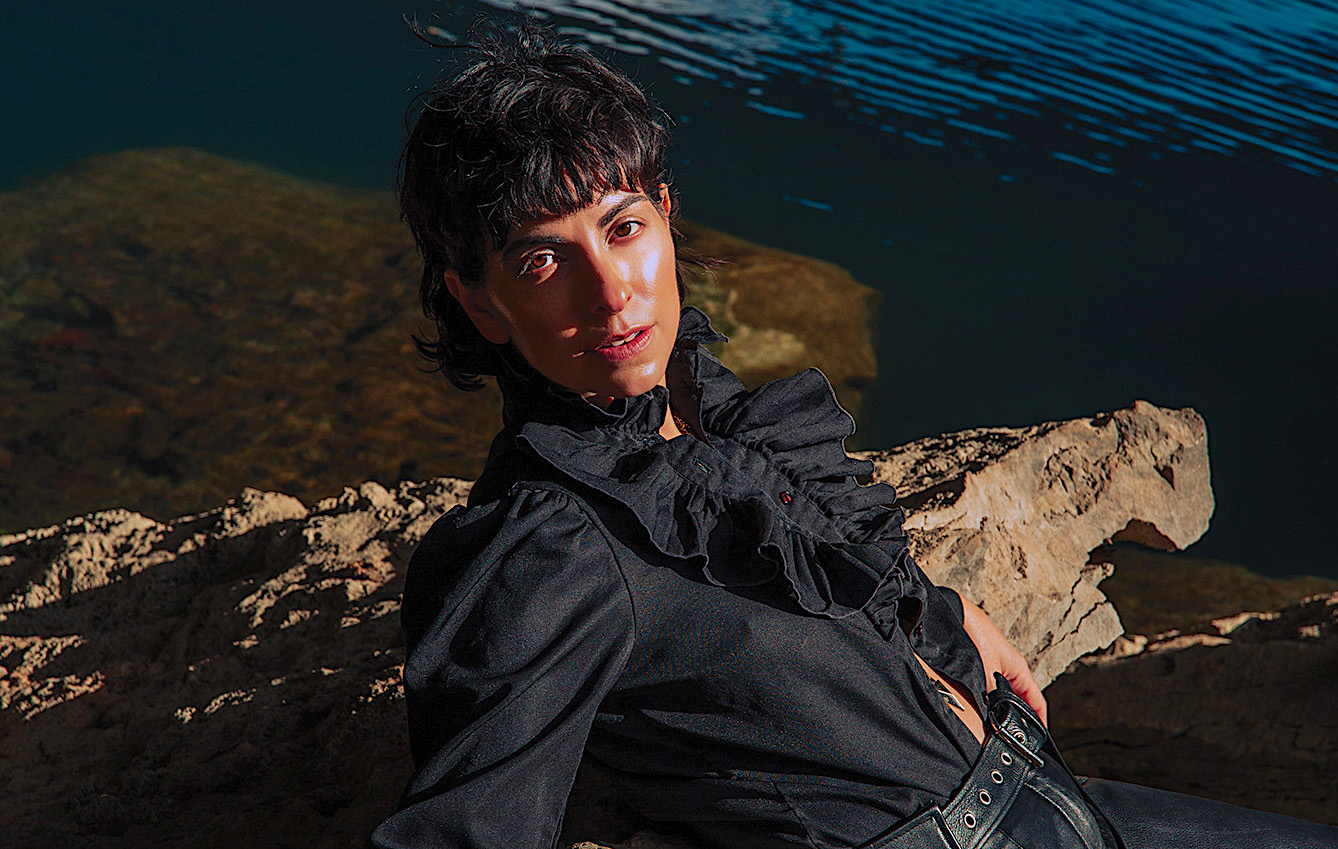Many albums emerged from the pandemic that explore the human desire to triumph over adversity. The ongoing pandemic has been a trying time for many of us, so it is expected that’s reflected in the art we consume. Left Hand, the new album from non-binary singer-songwriter Becca Mancari, explores this notion, yes—but it also does so much more.
Everything about the 12-track album feels like coming out of the darkness. Mancari’s soft, intimate vocals make you feel like you are on that journey into the light with them. Mancari was raised amongst Mennonites and fundamentalists in Staten Island, New York, and educated at an evangelical university. As a queer person, that upbringing was alienating and oppressive, and part of what Mancari explores in their music is coming into themselves and shaking off that past.
The album starts off strong with Mancari’s collaboration with Brittany Howard of Alabama Shakes called “Don’t Even Worry.” The track is moody and intense, with sharp and resounding violins punctuating the emotional moments in the song.
The lyrics tell the story of two people in a relationship, one trying to pull away and the other reassuring their partner with promises to stay.
Give give me all you got
I can handle it
Give give me all you got
I can handle it
Go and take your time
I’ll be right here
Don’t even worry
Don’t even worry, I got you.
It’s a beautifully composed song that utilizes Howard’s booming vocals in a more subdued fashion. The softness of the vocalizations are integral to the message of the song, helping to assure the listener that even they don’t have to worry; that they don’t have to disappear.
While it’s not unique to queer couples to have one person feel like they aren’t worthy of love, the vocalizing of that worry is very common in queer spaces. Because of the alienation and sometimes rejection queer people often experience during their early years, I find it’s common for us to feel unworthy. From having crushes on straight friends to being exiled by parents and family members, it can be an isolating time. This song expresses that in queer couples and even queer friendships, the reassurance comes and comes in strong, with whoever you love telling you that they will be there for you as you take the journey toward healing.
The first single released from the Left Hand was “Over and Over,” another song about the intricacies of queerness and queer relationships. Mancari documents a relationship that is vague in its borders and definitions, “being okay that we don’t know.”
In the song, Mancari talks about being “invisible/ Back in the closet, celibate,” and how that state complicated the boundaries of the relationship, all while complicating their image of themself. One can’t help but think of their religious upbringing, and how that history can constrict our relationships with ourselves and our sexualities.
“Over and Over” is accented by a strong drum presence, and the refrain of “we don’t have to talk about it.” Myself and many of my queer friends have been in these sort of amorphous relationships that resist confinement, that confuse and frustrate and thrill us. Many of our first relationships were like that, and I’ve never heard a song so expertly describe the phenomenon.
“Over and Over” and “Don’t Even Worry” are musically intense, but Mancari can effortlessly transition into dancey tracks like “Don’t Close Your Eyes.” This song is really about stepping into yourself and being your true self.
But the lightness of the song really moves away from that heaviness and estrangement, bringing the listener to a place of wonder as Mancari repeats “are you ready?” in their angelic tone. It begins with a synth instrument playing notes that sound like a sun shower. It’s a gorgeous track that I come back to often when I listen to the album.
As a lyricist, Mancari paints a portrait of a feeling, which isn’t always easy to do. I’m a poet, and in the poetry world you always hear the advice, “show, don’t tell,” and Mancari is definitely inclined toward that showing. “Only get one life, only get one time,” they sing—and that urgency to live a full life is reflected in every aspect of the song.
The title track is one of the most unique and strange on the album. It’s less a song and more of a spoken-word performance. Vocals are overlapped, Mancari’s voice is clear in some sections and distorted in others. It starts with a brief monologue that sees Mancari disoriented and wanting to come out of that space.

“I couldn’t feel my face, I couldn’t feel my body. I lost it. I don’t want to be just trapped inside myself anymore. I don’t want to just pretend anymore, I want to live, I want you to live too,” they say.
I want to resist making sweeping generalizations about who the “you” is here, but given the songs before this one, it would be understandable to assume a romantic relationship, especially when we get later in the song. “You loved me still/ You forgave me, you forgave me/ I have to forgive myself/ You have to forgive yourself.”
It’s expansive enough to interpret that the “you” can be representative of the listener as well. Many queer people have a general feeling of regret for not living as their true selves as early as they could have; for not loving fully because of fear of violence or retaliation. It’s assumed that there is a lack of courage, but really it is a lack of resources. People wouldn’t stay in the closet for years if they didn’t have the resources they needed to live as themselves.
When I hear lyrics like “I don’t want to be trapped inside myself anymore” paired with “I have to forgive myself,” this is the route my brain takes, one where Mancari is on a journey to forgive themself for not living out loud at some point in their life.
This is also where I find the resilience of queer people. In the face of violence and rejection, we find ways to love ourselves and each other, to resist by existing. In songs like “Mexican Queen” and “Eternity,” the focus is love, and to love someone as a queer person can be that exact resistance.
In other songs like “You Don’t Scare Me,” that resilience is much bolder and in your face. It’s a defiant song about standing up for yourself and stepping out of the shadow of your fear.
Tried to take my voice
Tried to crush my spirit down
Took me a long time to see it but I see it now
Once you open the door you can’t close it anymore
You don’t scare me anymore.
Here is the story of a person who is resisting their own oppression, and fighting back for likely the first time. The guitar is twangy and sharp, accenting Mancari’s “you don’t scare me anymore.” The song ends with the lyrics:
Love every blade of grass
Every stream of light
Forgive
What’s revealed it cannot be unseen
Forgive
You don’t scare me anymore.
We revisit this notion of forgiveness that is so present in Left Hand. To forgive yourself is a show of resilience. The ability to bounce back when you’ve harmed yourself is so important and crucial to the queer experience. The forgiveness that Mancari talks about feels divorced from the Christian tenet of forgiveness, one that often positions God as the ultimate absolver, and those who follow God’s word as sinners and perpetual missteppers who need to ask for forgiveness. To forgive yourself is a more intimate process, one in which the purpose is to stop from holding yourself back and to step into your powerful full self.
This album is emotional and resplendent, and is definitely a standout project in 2023, which says a lot in a year of such great music.
Left Hand is out now, available for streaming on Spotify and Apple Music and for purchase through Mancari’s website. Their North American tour kicks off Sep. 10 in Denver.


 Why you can trust Xtra
Why you can trust Xtra


